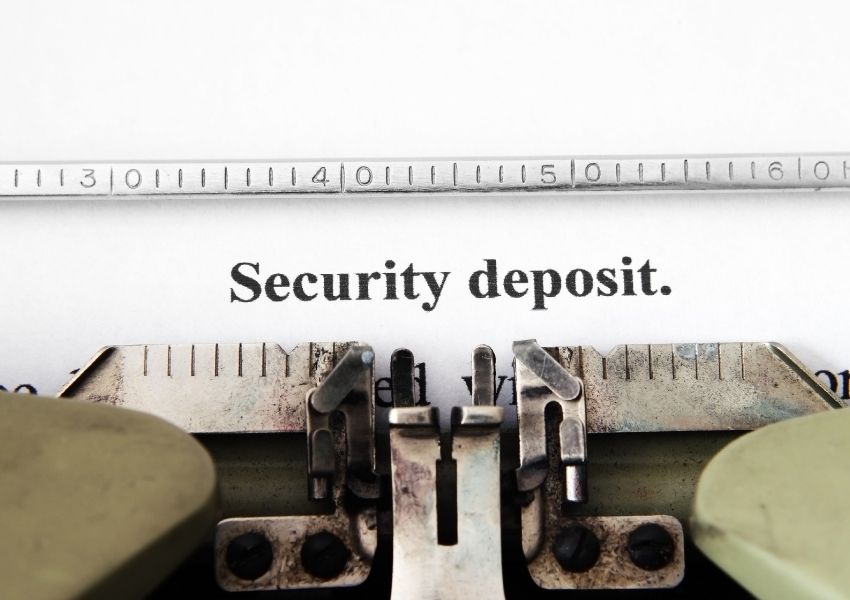
Both the landlord and the tenant have certain rights and responsibilities under Florida landlord-tenant law. As a landlord, one of the primary rights you have is to make deductions to the security deposit.
Florida landlords are obligated to follow the state’s security deposit laws when handling any tenant’s security deposit. These security deposit laws include procedures for storing the deposit, justified reasons for deductions, and, amongst other things, when to return the deposit.
Due to the importance of these laws, we at Volusia County Property Management have put together the following overview of the Florida security deposit laws.
Setting a Security Deposit Limit

In Florida, there are no limits as to how much a landlord can charge as a security deposit. But, in most cases, landlords typically charge no more than 2 months’ rent as a deposit. So, supposing the monthly rent is $1,500, then that would mean charging a maximum of $3,000.
Successful landlords know that asking for an excessive security deposit can potentially make your property less desirable to prospective tenants. Charging two months’ rent as a security deposit is enough to provide you with an adequate financial cushion against your tenant’s negligent actions.
But while there is no state law regarding security deposits, cities and counties are free to pass such legislation. As such, make sure to check with your municipality first to be sure there are no additional laws.
Charging Additional Deposits
Florida security deposit law does allow landlords to charge additional deposits. An example of such a deposit would be a pet deposit.
If you are charging a pet deposit, you should be aware of the Fair Housing Act provisions. Since disability is one of the protected classes under the act, it’d be unlawful to charge such a deposit on a tenant with a service animal or an emotional support animal.
Storing Security Deposits
As per the Florida security deposit laws. Landlords must store their tenants’ deposits in one of three ways.
- A non-interest-bearing account: You must not commingle the deposit with other funds in this account. Additionally, you must not use it prior to being due to you.
- An interest-bearing account: You must pay the tenant any interest earned annually and at the end of the lease. And at your tenant’s request, you can credit the interest payments back to the tenant in the form of rent. Should the tenant break their lease, there will be no interest due to you.
- A surety bond: This must be for the security deposit amount, or $50,000, whichever of the two is less. However, if you’re renting units in at least 5 counties, then you have the option of posting a bond with the Secretary of State for a quarter of a million dollars.
You’ll have 30 days once you receive your tenant’s deposit to choose your storage option. Once you have picked either of the three storage options, you must notify your tenant of the same.
Providing Written Notice

As already mentioned, Florida tenants have a right to be notified about the way their deposit is being held as per the security deposit laws and the landlord-tenant laws. In the notice, you must provide your tenant with important details such as:
- Where you’re storing their deposit.
- Whether you’re commingling the deposit with other funds or keeping them separate.
- The interest rate at which you’re holding your tenant’s security deposit if storing it in an interest-bearing account.
You may then send the notice either in person or via certified mail.
If you change the manner of holding, you’ll have 30 days from the day the change is made to let your tenant know of the same. This must be done through written notice and delivered in either of the two ways mentioned above.
Allowable Deductions
When deducting from the security deposit, make sure you do so consistently as if you don’t you may breach the Fair Housing Act. As per Florida security deposit laws, landlords may be able to deduct the following from your tenant’s security deposit:
- Unpaid rent.
- Costs of fixing excessive property damage.
- Costs of monetary damage caused by the tenant’s breach of the lease.
- Charges are allowed to be deducted under the lease or rental agreement. An early lease termination fee is a good example.
Should your tenant face eviction, you may also be allowed to make deductions. But this would be determined by the circumstance.
Understanding Normal Wear and Tear vs. Excessive Damage
Understanding the differences between normal wear and tear and excessive damage can go a long way to minimize any conflicts between you and your tenants. This is especially true when it comes to security deposit deductions.
Normal wear and tear can refer to the damage that occurs due to the normal use of the property. These sorts of issues are minor and include things like faded paint, gently worn-out carpet, and lose door handles.
Excessive damage is the damage that results from misuse, carelessness, negligence, accident, or misuse by a tenant. The result of this affects the value, usefulness, and normal function of the rental unit.
Examples of damage include broken tiles, pet damage, hole in walls, and broken windows.
Returning Tenant’s Security Deposits

Once your tenant vacates the unit, you’ll have 15 days to return their deposit if there are no deductions. If you intend to make deductions, then you’ll have 30 days once they move out to provide them a written itemized list of deductions.
If you fail to provide the itemized list of deductions and make the deductions anyway, you’ll forfeit the right to keep any part of their deposit.
Landlords in Florida must send the notice of the itemized list of deductions via certified mail. Once they receive the notice, they will have 15 days to dispute any claims or charges.
However, if they don’t lodge any disputes, then you’ll have 30 days to send them the remainder of their security deposit.
Bottom Line
At Volusia County Property Management, we understand the importance of the security deposit laws and how they function within the Florida rental market.
So, if you have any questions regarding Florida security deposit law or are looking for help in any other aspect of property management from a property management company, Volusia County Property Management is here for you, get in touch today to learn more!
Disclaimer: This blog isn’t a substitute for expert legal advice provided by a qualified attorney or property management company. Additionally, laws can change daily and this blog may not be updated with the latest legal developments. In such a case we would encourage you to seek legal assistance.